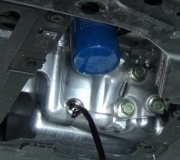That is amazing. We normally know what to recommend when we have your best interest at heart, then we get accused of trying to sell you things you think are not needed. That happens so often that many mechanics keep their mouths shut when they see things that might leave you sitting on the side of the road in the near future. It is easier to keep quiet than to argue with customers.
You have a dealer with people who know your car was not ready for an oil change, and they did not take your money for an unneeded service. What they neglected to do is explain why the oil change was not needed, or to ask you if there was a special problem or concern that would have been solved with that oil change. For example, while this would not typically apply to a car as new as yours, if the engine recently suffered a no-start condition and excessive unburned gas may have dribbled into the oil and diluted it, that has to be drained out right away to prevent damage. That would warrant an oil change even if one had been done just days ago. Usually a mechanic is repairing the no-start problem, and he would know to do the oil change.
Also, most manufacturers add special additives to the oil when they build the engine to aid in proper break-in. You do not want to drain those additives out before they have had time to do their job. How long any engine lasts has a lot to do with observing proper break-in procedures. That typically includes plenty of highway driving for extended periods with the engine at normal temperature. Ninety nine percent of engine wear takes place when the engine has not reached normal temperature. That is where internal parts have expanded to fit properly. If you do only slow-speed or short-trip driving, six months is much too long to go between oil changes. Most of the harmful contaminants vaporize and are sucked out to be burned when the oil gets hot. Those contaminants accumulate in the oil if it never gets hot enough for those things to vaporize. The oil itself is still okay, but it is the contaminants that cause sludge that need to be gotten rid of. A good compromise is to get the car out on the highway once a week or every other week for a good twenty to thirty mile trip.
If you do regularly drive some distance at highway speed, but only a few times per month, that is when the additives in all oil wears out, and that is the time to go by mileage to determine when an oil change is warranted. Those additives do not deteriorate when the engine is not running and the car is just sitting. Most manufacturers recommend the oil be changed every 3,000 miles based on "normal" driving conditions. Some specify as much as every 7,500 miles to make their cost of regular maintenance appear to be lower than that of their competitors, but then they have a different recommendation for what they call "severe" driving conditions. What they list as "severe" is almost identical to what honest manufacturers call "normal". In fact, for those shady manufacturer's listings, it is just about impossible to drive the car and fall under their "normal" driving conditions. You will still be changing the oil every 3,000 miles even though that is not what they advertised.
Scheduling oil changes according to the calendar does not make sense unless that closely correlates to what your driving habits dictate. You could be wasting money or you could be going too long between changes.
Friday, June 16th, 2017 AT 1:11 AM




